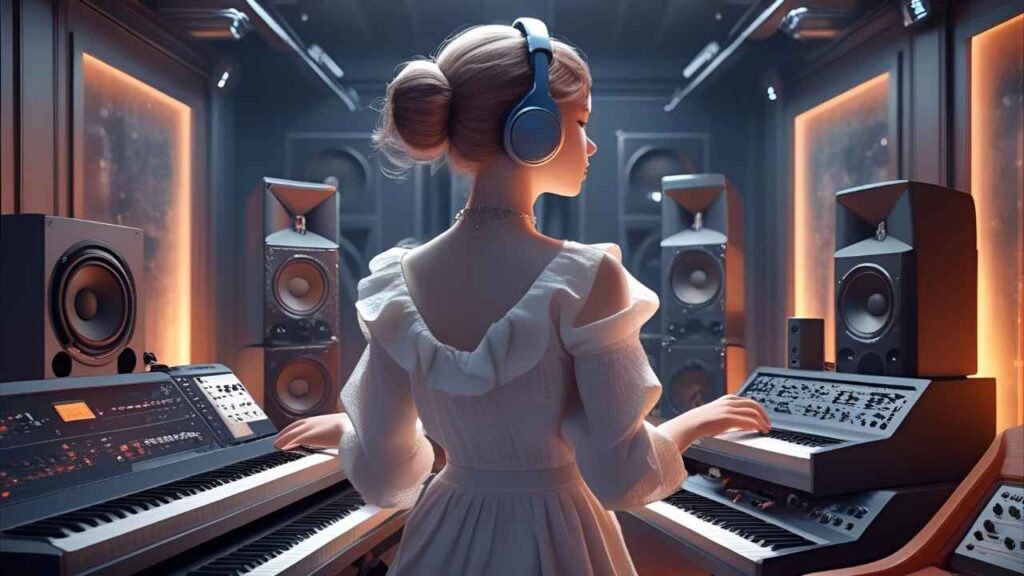AI music generators are a revolution in the music industry since they are changing it by making music accessible to anyone. These new technologies utilize the power of artificial intelligence so that anyone can create, arrange, and produce professional-quality music, whether they are musically trained and have recording experience or not. Whether it is the content creators who want a background score to complete their content perfectly or experienced musicians who are also interested in new avenues of creativity, AI Music Generators are transforming the ways we approach musical composition.
The state-of-the-art music AI systems employ advanced machine learning algorithms and neural nets, as well as deep learning systems, to examine massive databases of musical patterns, styles, and structures. The technology allows them to create original pieces that mix genres, going all the way up to classical symphony, to the present electronic trend. These tools have acquired the status of an absolute necessity in the hands of video producers, podcasters, game developers, and social media influencers who require unique music, without having to resort to advanced and tedious mechanisms of traditional musical compositions.
What are AI Music Generators?
AI Music Generators is one of the most innovative types of software programs that are based on artificial intelligence and are capable of producing music on their own. Such advanced systems use machine learning, neural networks, and pattern recognition systems to model current musical forms, then create new music together with the user as they supply inputs, including text commands, any style preference, or similar music.
Their basic technology is to train the AI models on large databases with millions of music pieces representing different genres, styles, and traditions to cover. In such a way of thorough studying, the AI gains the knowledge of musical theory, harmony, rhythm patterns, and techniques of composing. With the interaction of users with these platforms, the AI uses this information to come up with unique musical pieces to match the outlined parameters.
Key Features of AI Music Generators
The ecosystem of AI music composition has developed into advanced functionality that covers both inexperienced users and expert producers. Those features are what define modern platforms as something more than basic beat-making equipment and position them as a complex creative tool.
- Text-to-Music Conversion: Enhanced natural language processing allows users to explain their vision of music in simple terms, and AI uses the explanation to create an equivalent of it.
- Multi-Genre Capabilities: Numerous collections of music libraries with over hundreds of musical genres guarantee the possibility for the user to discover various creative frontiers, either through classical orchestrations or contemporary electronic dance music.
- Real-Time Editing: The interactive modification tools give users the capability to modify things, such as tempo, key signatures, instrumentation, and structural elements, and have coherence in the subject of the music as the composition is taking place.
- Audio Separation Technology: Advanced algorithms are able to separate audio stems of individual instruments of pre-existing songs, allowing users to reproduce and perform their arrangements or practice materials, or reconstruct or remix versions.
- Commercial Licensing: The overall management of rights entails having applicable rights that govern how produced music is used, to the effect that creators can generate profit across diverse media, without the fear of breach of copyright.
Comparison Table for AI Music Generators
| Name | Rating | Website URL | Key Differentiator |
| AIVA | 4.5/5 | aiva.ai | 250+ preset styles with professional MIDI editing capabilities |
| Suno | 4.7/5 | suno.ai | Advanced v4.5 model with multi-language vocal support |
| Udio | 4.6/5 | udio.com | Community sharing platform with professional-grade output |
| SOUNDRAW | 4.4/5 | soundraw.io | Ethical AI training with genre-mixing capabilities |
| Mubert | 4.3/5 | mubert.com | Real-time generation with extensive API integration |
| Soundful | 4.2/5 | soundful.com | 150+ templates with comprehensive licensing structure |
| Beatoven | 4.1/5 | beatoven.ai | Text-to-music with “Fairly Trained” certification |
| Mureka | 4.0/5 | mureka.ai | Personal model training with uploaded music |
| Landr | 4.3/5 | landr.com | Complete ecosystem with mastering and distribution |
| Moises | 4.2/5 | moises.ai | AI-powered practice companion with audio separation |
Top 10 AI Music Generators
1. AIVA (Artificial Intelligence Virtual Artist)
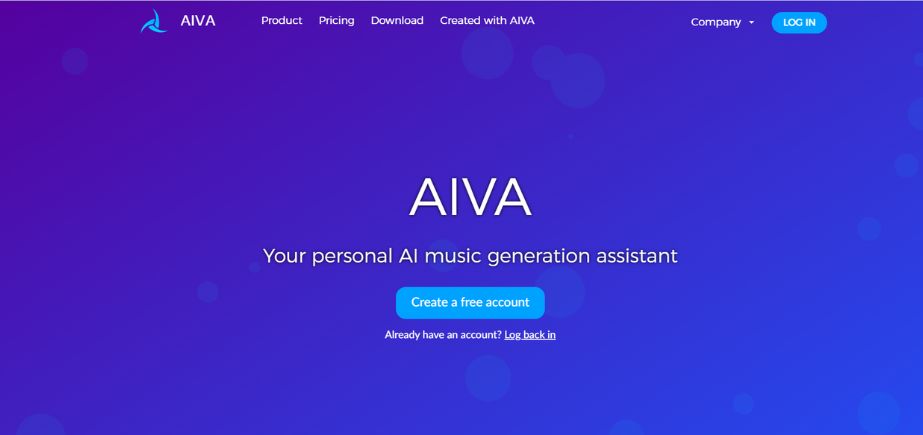
Type: AI Composition Assistant
Rating: 4.5/5
Website: aiva.ai
AIVA is currently the most advanced AI Music Generator on the market, and allows compositions of a high-quality professional level in a range of over 250 music styles. The site can be used by novices and those who want to write easy music as well as by professionals, who have a need for complicated orchestral performances. It has three levels of price based on different usage contexts of a free piece of composition, which requires attribution to allow free use and commercial use, where copyright is completely owned by the author.
The system has outstanding achievements in the composition of cinematic soundtracks, classical, and contemporary ones due to its neural network architecture. Users may even exert some control over the process by loading reference MIDI files or audio samples so that the AI could comprehend the particular stylistic tastes and trimmings and deploy them to new pieces. The professional-level export features of the platform support a variety of file formats and individual instrumental stems of the mixing and mastering workflows.
Key Features:
- 250+ musical styles
- Reference track integration
- Professional MIDI editor
- Multi-format exports
- Tiered usage rights
Pros:
- Extensive style library
- Professional-grade outputs
- Flexible licensing options
Cons:
- Steep learning curve
- Limited free features
- Complex interface navigation
Pricing: Free plan with attribution, Standard at $11/month, Pro at $33/month
2. Suno
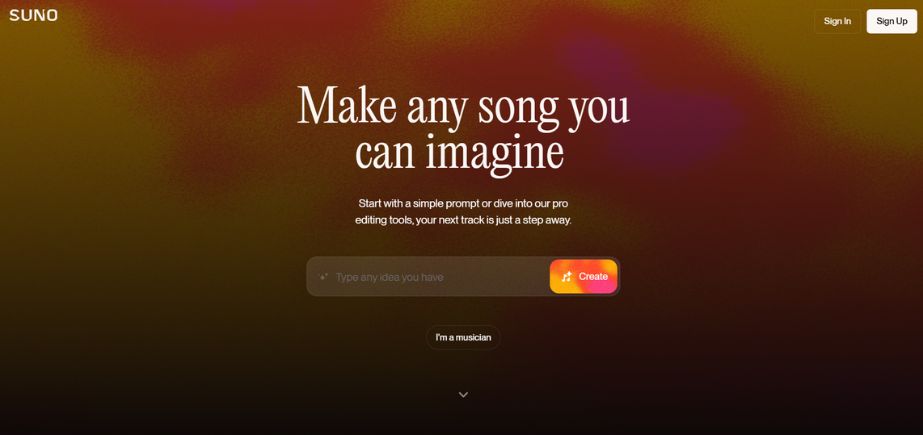
Type: Text-to-Music Platform
Rating: 4.7/5
Website: suno.ai
Suno can be viewed as the future of text-to-music technology, as its latest v4.5 model is among the most dynamic models that create compositions of extraordinary genres pinpointed with extreme precision. The feature known as Personas remembers the user preferences session to session, producing consistent quality and adherence to style in continually developing projects. This feature makes Suno especially useful in the hands of a content creators who require consistency in music theme between various works.
The feature that separates the system from its rivals is multi-language voicing support, where it produces realistic-sounding vocals in Japanese, French, Spanish, Italian, Chinese, Korean, and Arabic. The stem separation feature gives the user access to the individual audio tracks to edit and also mix to perfection, as well as the song extension technology can solve problems of analyzing and continuing existing songs of similar tracks.
Key Features:
- Advanced v4.5 model
- Multi-language vocal support
- Stem separation technology
- Song extension capabilities
- Mobile app availability
Pros:
- Exceptional output quality
- Multi-language support
- Consistent style memory
Cons:
- Premium features expensive
- Limited free generations
- Processing time delays
Pricing: Free plan with 50 credits, Pro at $10/month, Premier at $30/month
3. Udio
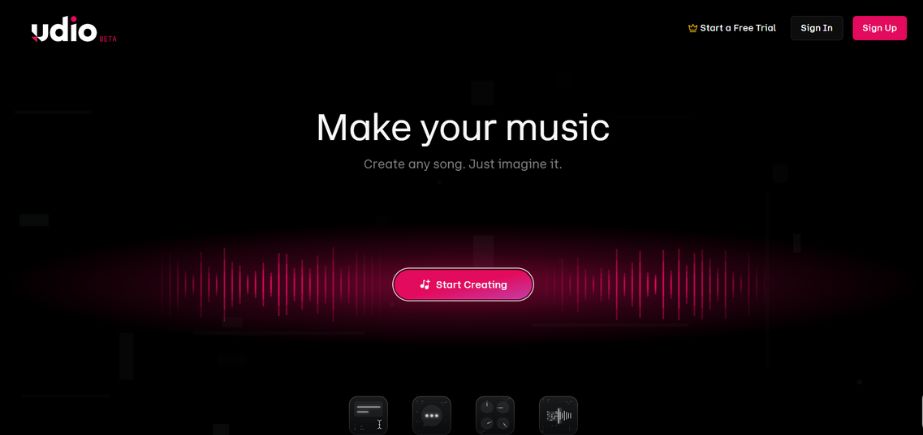
Type: AI Music Composition Platform
Rating: 4.6/5
Website: udio.com
Udio takes a description of a natural language and evolves it into a full professional version song with a professional arrangement and organizational structure. The neural networks of that platform create constructions with a very realistic appearance and can be used as a complete product or a starting point to make additional work. It has a community sharing feature that establishes an ecosystem in which stakeholders can search, subscribe, and collaborate with other musicians.
Advanced editing features consist of track extension, inpainting to replace select parts, and full remixing features. Such features can give the users fine control of their work, even as the editing process includes musical integrity. The community-based approach to interaction and discovery marks the platform as distinct from generation tools that are more individualistic.
Key Features:
- Natural language processing
- Advanced editing tools
- Community sharing platform
- Professional-grade output quality
- Inpainting capabilities
Pros:
- Intuitive text prompts
- High-quality outputs
- Active community features
Cons:
- Limited customization options
- Server capacity issues
- Subscription-based access
Pricing: Free tier available, Standard at $10/month, Professional at $30/month
4. SOUNDRAW
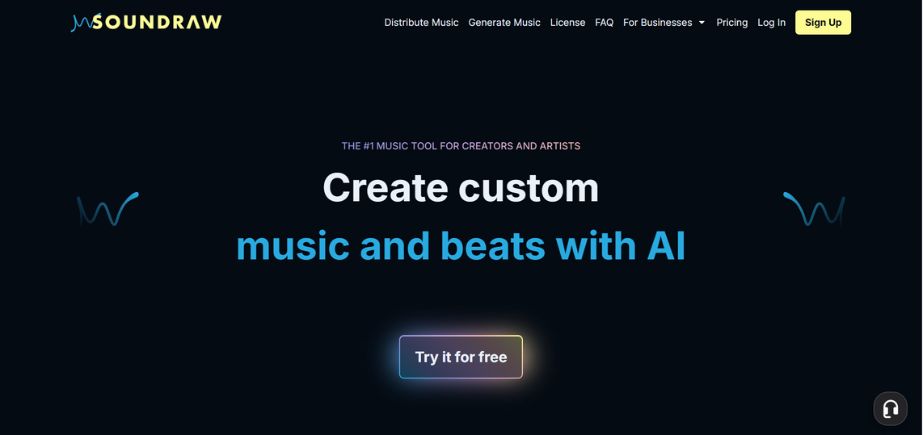
Type: Custom Music Creation Platform
Rating: 4.4/5
Website: soundraw.io
SOUNDRAW stands out by its moral stance on AI training, selecting only first-hand developed content, solely created by in-house producers, not training on the work of other artists. According to this method, all produced music will be fully unique and will not be of copyright violations. V2 system of the platform gives an opportunity to the users to mix various musical styles and compose unusual cross-genre music that challenges the artistic boundaries.
The tools that are used to customize the song structure allow all the sections of the music to be rearranged in detail, which gives a user an opportunity to create intros, verses, choruses, and bridges based on their particular creative ideas. The distribution integration option is directly linked to streaming services such as Spotify and Apple Music so that the user can release and monetize his/her AI-composed music but retains all the royalty rights.
Key Features:
- Genre mixing capabilities
- Song structure customization
- Distribution platform integration
- Ethical AI training
- Commercial usage rights
Pros:
- Ethical training approach
- Full commercial rights
- Direct streaming distribution
Cons:
- Limited style variety
- Subscription required
- Basic editing interface
Pricing: Personal at $19.99/month, Creator at $39.99/month, Artist at $199/month
5. Mubert
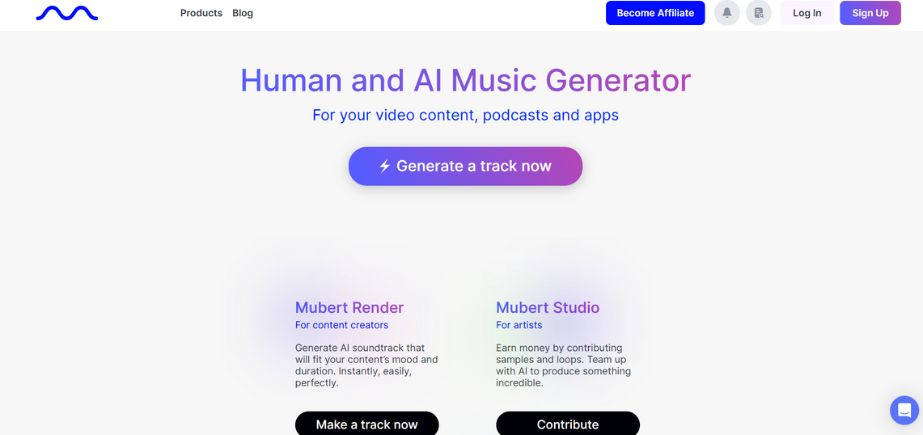
Type: Algorithmic Music Generation System
Rating: 4.3/5
Website: mubert.com
Mubert is a fully-fledged ecosystem in algorithmic music creation that uses sample libraries to generate bespoke pieces of music. Mubert Create with Mubert Render, Mubert Studio, and Mubert API provide unique services to the platform. The first service is dedicated to Content creation, the second one is oriented toward the services of the Musicians, and the last one is designed to use the services of the product through APIs. This tri-modal tool provides an optimistic ground between the AI technology and the creativity of humans.
Mubert has a real-time generation of music, which is especially useful with live streams and other interactive app types or dynamic materials where music should be able to change according to the situation. The developer API allows plugging into third-party software, games, and platforms without difficulty and generates personalized music in real-time in the context of an established software ecosystem. The interaction with human artists stimulates that the produced music has organic characteristics and artistic inspiration.
Key Features:
- Real-time music generation
- Comprehensive developer API
- Multi-platform integration
- Human artist collaboration
- Adobe software extensions
Pros:
- Real-time generation
- Extensive API capabilities
- Human-AI collaboration
Cons:
- Limited customization control
- Repetitive sample usage
- Complex pricing structure
Pricing: Ambassador (Free) 25 tracks/month, Creator at $14/month, Pro at $39/month
Related Blogs:
- Best AI Image Generators
- Best UPI QR Code Generators
- Best AI Business Plan Generators
- Best AI Excel Formula Generators
6. Soundful
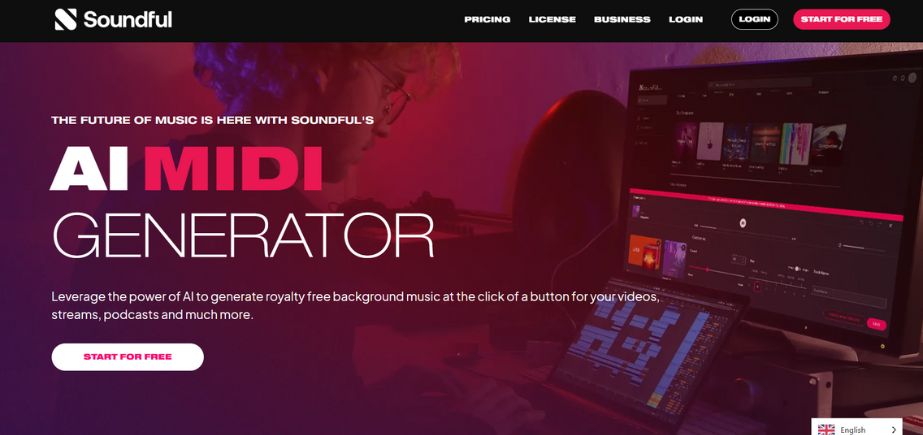
Type: Royalty-Free Music Creation Platform
Rating: 4.2/5
Website: soundful.com
Soundful offers a simplified method of creating royalty-free music as the company has a notable game-wide selection of templates through the generations of over 150 styles in many kinds of music. The site is aimed at providing ready-to-use content to content creators, musicians, and brands, giving them the opportunity to create quality music tracks without needing to be musically inclined and go through demanding customization procedures. Its simple workflow also allows users with different and diverse levels of technical expertise to access professional-quality music.
The multi-format exporting supports MP3, WAV, and full STEM packs containing individual instrument files and MIDI files. Such leeway supports variable production workflows and can further decompose the audio in professional audio applications. The business model of licensing has well-defined rights of usage over various platforms, such as social media content and large-scale commercial productions.
Key Features:
- 150+ style templates
- Multi-format exporting
- STEM pack availability
- Commercial licensing structure
- Distribution platform integration
Pros:
- User-friendly interface
- Clear licensing terms
- Comprehensive export options
Cons:
- Template-based limitations
- Limited genre variety
- Subscription required
Pricing: Standard at $9.99/month, Premium at $24.99/month, Enterprise custom pricing
7. Beatoven
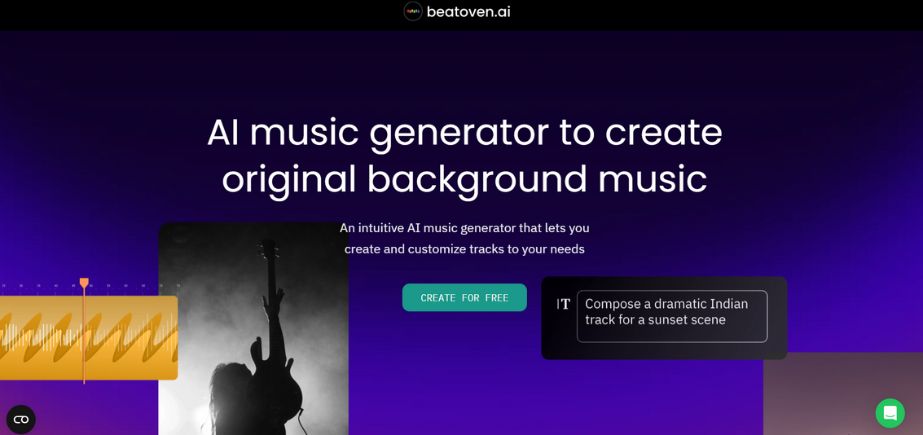
Type: Text-to-Music Conversion Tool
Rating: 4.1/5
Website: beatoven.ai
Beatoven is a company that specializes in transforming text descriptions to create individual background music on most media platforms, such as videos, podcasts, games, and other artistic projects. The certification under the heading of Fairly Trained on the platform shows that the platform is committed to the ethical development of AI and content production that would be ethical. Such positioning will attract visionaries, who are more worried about the ethical aspects of the tools they use.
The sound customization functionality enables live modifications of rhythmic patterns, tempo, and genre definitions, and exact control of results. The adaptive AI composition system is data-driven, which means it is based on feedback from users, and each beat sound produced is highly crafted and modified according to its definition. Templates of specific genres also eliminate the complication involved in benchmarking through a production process, as well as consistency in selected music styles.
Key Features:
- Text-to-music conversion
- Dynamic beat customization
- Adaptive AI composition
- Genre-specific templates
- Ethical training certification
Pros:
- Ethical AI development
- Intuitive text prompts
- Real-time customization
Cons:
- Limited advanced features
- Basic editing capabilities
- Restricted output formats
Pricing: Free plan available, Standard at $3/month, Premium at $6/month
8. Mureka
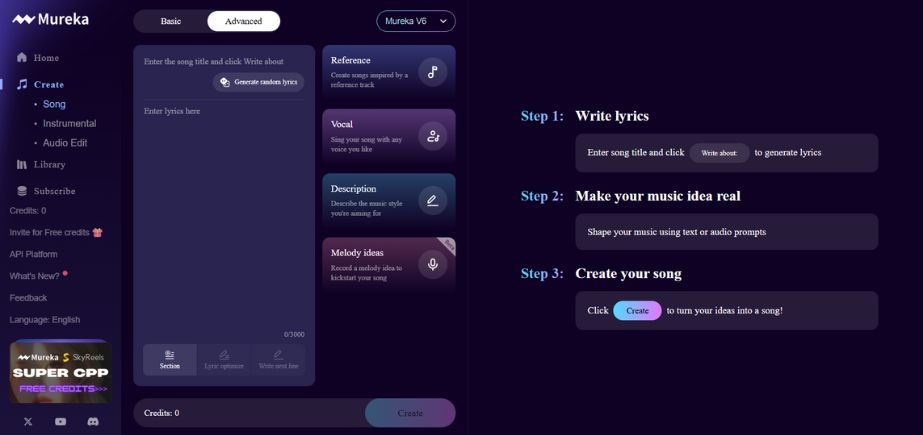
Type: Personalized AI Music Platform
Rating: 4.0/5
Website: mureka.ai
The Mureka service completely changes the ways users can create personal music because it allows individuals to build their own AI on the cloud by uploading any personal music library to personalize their music. This special system enables it to get to know personal music tastes and style fingerprints on a per-person basis and creates a piece of music that is very close to the individual’s sought-after tastes. With the latest 1.1.4 update, incisive region editing and song extension are available, and by using these features, it is possible to have fine-grained control over certain parts in the composition.
The site allows several creation processes, such as text descriptions, reference tracks, vocal inputs, and written melody ideas that suit different creativity processes and inspirations. The ability to access from any platform means that users can compose music with the help of AI on any web interface or mobile application, so the access is consistent and can be done from practically any device that has access to the internet.
Key Features:
- Personal model training
- Multiple creation methods
- Advanced editing capabilities
- Cross-platform availability
- API service integration
Pros:
- Personalized AI models
- Multiple input methods
- Cross-platform access
Cons:
- Training time required
- Limited free features
- Complex setup process
Pricing: Basic at $9.99/month, Pro at $19.99/month, Enterprise custom pricing
9. Landr
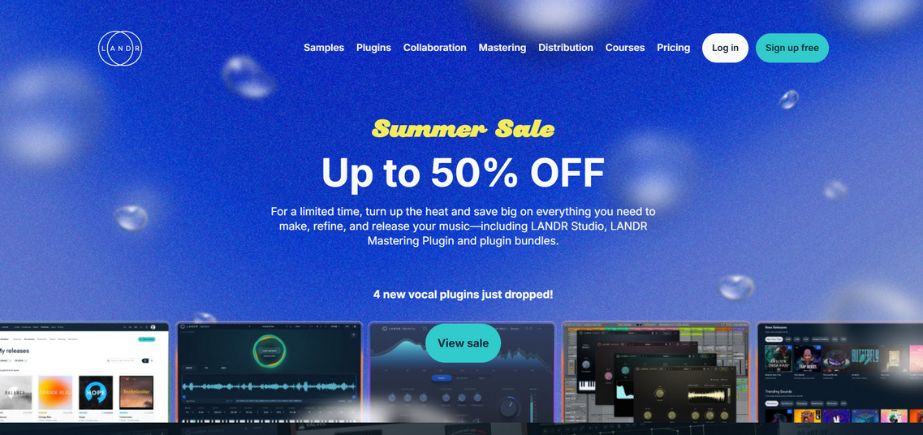
Type: Comprehensive Music Production Ecosystem
Rating: 4.3/5
Website: landr.com
Landr is not just a tool to make simple music; Landr is an all-in-one solution to music creation and release in the contemporary world. The platform is a mixture of AI-based mastering technologies with distribution, collaborative, and creative tools to serve musicians at any stage of production. Its main mastering service is an imitation-as-culture, using expert machine learning models to recognize tracks and automatically genre-detail processing for them.
The unlimited distribution aspect links the users to more than 150 streaming platforms, like direct publishing of mastered songs to Spotify and Apple Music. The co-creation is enabled through the collaboration tools that have real-time feedback systems and enable the sharing of the project. The huge sample library allows access to royalty-free sounds and loops, facilitating inspiration, as well as professional additions to the entire composition.
Key Features:
- AI mastering technology
- Unlimited streaming distribution
- Collaboration tools
- Extensive sample library
- Music promotion support
Pros:
- Complete production ecosystem
- Professional mastering quality
- Streaming platform integration
Cons:
- Higher pricing tiers
- Complex feature set
- Steep learning curve
Pricing: Basic at $7.50/month, Standard at $15/month, Pro at $29/month
10. Moises
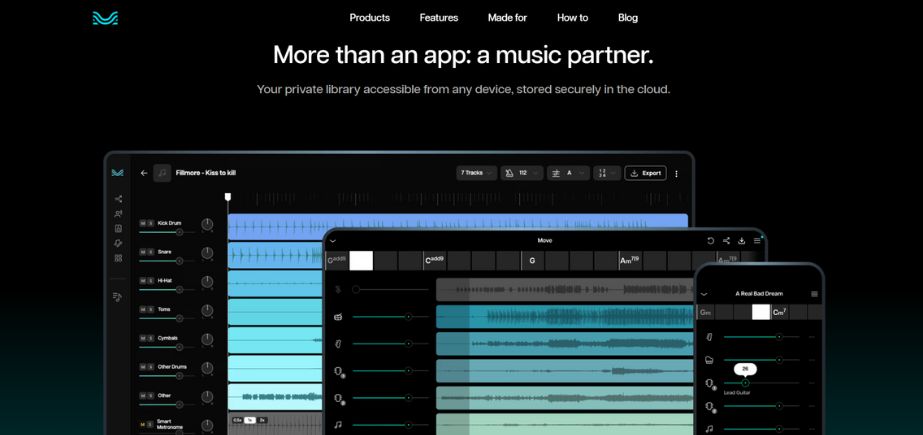
Type: AI-Powered Music Practice Companion
Rating: 4.2/5
Website: moises.ai
Moises is an intelligent practice solution that turns any song into a personalized learning experience using mature audio separation technology. By transferring vocals, drums, guitar, bass, and other instruments to a platform, musicians will be able to make upbeat practice sessions, with certain aspects getting muted or specific passages of the song getting emphasized. This feature makes it priceless to musicians who would like to enhance their talent or design personal arrangements.
The real-time processing ability transforms audio files in real time, making it possible to separate and extract musical elements in real time. Its stem generation capability generates separate track files that are compatible with Digital Audio Workstations, offering greater flexibility in high-detail editing and remixing assignments. Automatic tempo and key identification ease the incorporation and control of tracks in different musical aspects.
Key Features:
- Advanced audio separation
- Real-time processing
- Stem file generation
- Automatic tempo detection
- Cloud-based storage
Pros:
- Advanced separation technology
- Real-time processing
- Cross-platform synchronization
Cons:
- Practice-focused features
- Limited generation capabilities
- Subscription-based access
Pricing: Free tier available, Premium at $4.99/month, Premium+ at $9.99/month
How to Choose the Right AI Music Generators
The choice of the correct AI Music Generators should be done with precise focus on certain creative demands, technology-related demands, and budgetary restrictions. The multiplicity of existing platforms implies that various tools, which offer good results in some areas of music creation, are more suitable within specific areas of application and among different groups of users.
- Purpose: It is important to determine your use case, i.e., producing background music for your content, learning how to play a musical instrument, attaining commercial tracks, or experimenting with creative instruments of composition.
- Skill Level: Evaluate your musical intelligence and your technical skills so as to select the sites that are easy on your side regarding complex functions, as opposed to being user-friendly.
- Budget: Compare the total cost of ownership with the subscription costs, limitations on the number of uses, and other features needed to support your particular workstream.
- Output Quality: Try out the sound of various platforms, the harmony of the music, and the style to make sure that the compositions you generate are what you require to be used professionally or personally.
- Licensing Terms: Know your license rights, your attribution requirements, and your commercial rights with generated music so you do not find yourself institutionally engaging in music in the context of your expected applications.
Benefits of Using AI Music Generators
The implementation of AI Music Generators is a transformative experience, as there are more benefits than just music created using suggestions. The design offers cost-efficiency, creative enhancement of the imagination, and professional growth potential. Such advantages explain the utility of AI music tools among a wide range of audiences and imaginative functions.
- Accessibility: Due to the democratization of music creation with easy access to the means of music creation with no musical knowledge required, and costly instruments or studio availability, musical concepts can be shared virtually without any technical training.
- Time Efficiency: High speed of the text generation process will also save a lot of time spent on producing music, which now takes hours or days to make manually, and only minutes with the AI support.
- Cost Effectiveness: The savings in the costs of hiring composers, instrument purchase, studio time rentals, and licensing of existing music make costlesshigh-qualityy compositions, at a fraction of the traditional costs.
- Creative Exploration: Feeding the users a wide range of music genres, tastes that seem to be colliding, and innovative musical variations that would not challenge users being composed in more traditional ways broadens imaginative possibilities and gives new artistic ideas to follow.
- Scalability: A high rate of multiple composition creation makes content professionals able to be topic consistent without limitation on available resources, and also experiment with a variety of musical styles in order to create a matching style to the changing project conditions.
Conclusion
The world of AI Music Generators is developing ever faster and is capable of providing unimaginable opportunities to those who want to create music, regardless of their level they possess and which industry they operate in. These advanced platforms have moved music-making procedures, which were accessed by a few and required years of preparation, into a more comfortable creative context where anybody can communicate musical thoughts and create expert-quality compositions. Items such as text-to-music generation, plus complex audio segmentation and model training, are just some of the assorted tools accessible to people on the contemporary AI apparatus to solve a variety of creative issues.
The ability to select the optimal AI Music Generators would require knowledge of the needs in particular cases, an assessment of the possibilities of platforms, and a thought through long-term goals on the creative front. The range of applications Alliance looks to get in coverage of production music is limited largely to your immediate need, whether an easy background track to an Instagram post or a massive composition to support a media house. The ecosystem at the moment has offerings to enable practically all purposes and all budgets.
Frequently Asked Questions
1. Will AI Music Generators put out human composers in the market?
Whereas AI Music Generators produce highly effective music compositions faster and cheaper than human composers, it is accurate to say that the program and technology are more of an empowering tool than a one-time replacement.
2. Are AI Music generators created songs copyrighted?
The right of copying or copyright differs greatly across platforms and subscription levels. Any decent AI music producer has a clear license criterion, and some of them can even bring you royalty-free music to use in commercial works.
3. How do AI Music generators learn music?
The AI Music Generators are normally trained on large libraries of existing music works, which can analyze the trend in melody, harmony, and rhythm, and the arrangement of music, among others.
4. Is it allowed to use own music and train AI Music Generators?
There are a number of websites, such as Mureka, where one can upload their music so as to train their own individualized AI models. Such an aspect allows the AI to understand individual musical preferences and styles and create compositions that are similar to individual tastes.
5. Which audio formats are common with AI Music Generators to export?
Professional AI Music Generators mostly have several export formats such as MP3, WAV, MIDI, and FLAC. High-end platforms supply STEM files having detached instrument tracks and allow in-depth editing on Digital Audio Workstations.
